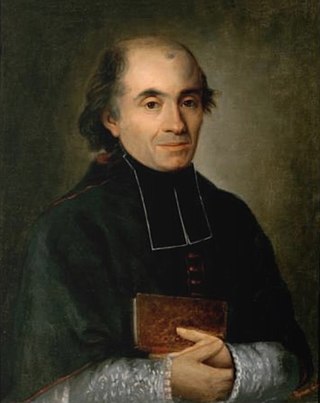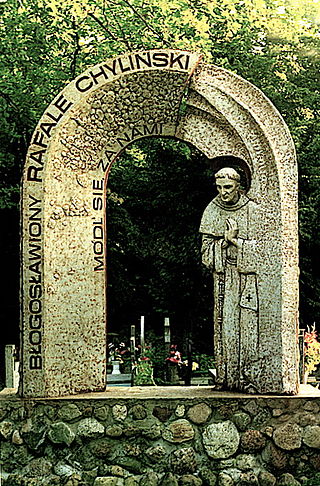
Jacques-Désiré Laval was a French Roman Catholic priest who served in the missions in Mauritius; he was a professed member from the Spiritans. He is known as the "Apostle of Mauritius" due to his tireless work in aiding the poor and ill. Laval also educated the flock he was assigned to for those people were uneducated and were former slaves for the most part. His skills in medicine made him a distinguished figure in the region since his expertise allowed him to tend to those who suffered illness that manifested more so during times of an epidemic.

Josep Manyanet i Vives, SF was a Spanish Roman Catholic priest and the founder of the Sons of the Holy Family and the Missionary Daughters of the Holy Family. He served in a range of capacities as a parish priest before establishing both religious orders in order to spread devotion to the Holy Family to whom he fostered an intense devotion.

Maria Domenica Mantovani was an Italian Roman Catholic professed religious, and the co-founder of the Little Sisters of the Holy Family; she established them alongside Giuseppe Nascimbeni. As a nun she received the religious name of Maria of the Immaculate.

Giovanni Calabria was an Italian Roman Catholic priest who dedicated his life to the plight of the poor and the ill. He established two congregations, the Poor Servants of Divine Providence and the Poor Sisters Servants of Divine Providence to take better care of poor people in various Italian cities and later abroad while underpinning the need to promote the message of the gospel to the poor.

Assunta Marchetti was an Italian Roman Catholic religious sister and the co-founder of the Missionary Sisters of Saint Charles Borromeo Scalabrinians; she worked in Brazil from 1895 until her death. She has been beatified as a Blessed Mother. Her priest brother Giuseppe is titled as Venerable on the path to sainthood.
Luca Passi was an Italian priest and the founder of the Teaching Sisters of Saint Dorothy. Two brothers of his were priests – following the example of their paternal uncle – and Passi himself moved to Venice in order to dedicate himself to both his preaching and educational missions.

Giuseppe Nascimbeni was an Italian Roman Catholic priest who exercised his pastoral mission in his home of Verona and who also established the Little Sisters of the Holy Family.

Pierre Bonhomme was a French Roman Catholic priest who exercised his pastoral mission in Cahors. He went on to establish the new religious congregation known as the Sisters of Our Lady of Calvary of Gramat.

Paula Montal Fornés was a Spanish Roman Catholic professed religious and the foundress of the Sisters of the Pious Schools. Montal Fornés dedicated her religious career to serving as an educator in Barcelona where she founded schools for people in the area. The death of her father when she was ten forced her to help her mother raise her siblings though was free to pursue her religious inclinations once this was achieved; she and a close friend began setting up a series of schools before formalizing her idea for the establishment of a religious congregation that would be based on education and the establishment of additional schools nationwide.

Leopoldina Naudet was an Italian Roman Catholic of both French and Austrian origins. She was a religious sister of the Congregation of Dilette of Jesus and the foundress of the Sisters of the Holy Family of Verona. Naudet served in the court of Leopold II, Holy Roman Emperor and after his death served his daughter Maria Anna who became an abbess and professed religious alongside Naudet and her sister.

Josep Tous Soler was a Spanish Roman Catholic priest and a professed member of the Order of Friars Minor Capuchin - a branch of the Franciscan Order. Upon becoming a friar he was called by the religious name Josep of Igualada and went on to preach across both Spain and France.
Ferdinando Maria Baccilieri was an Italian Roman Catholic priest and a professed member of the Secular Servites. Baccilieri was also the founder of the Sisters Servants of Mary of Galeazza - a religious congregation designed for women. He had become well known for restoring a troubled parish to one brimming with the faith and was made its parochial vicar as a result of his good work and effort in the Bolognese parish.

Brigida Morello Zancano, born Brigida Morello, was an Italian Roman Catholic widow and later a nun of the Ursuline Sisters of Mary Immaculate that she herself had established in her widowhood. She would assume the name of "Brigida of Jesus" when she founded her congregation.

Eugenia Maria Ravasco was an Italian Roman Catholic nun of the Ravasco Institute that she herself had established - the order was also known as the Daughters of the Sacred Hearts of Jesus and Mary and was founded in the Archdiocese of Genoa where she spent most of her life.

Blessed Luigi Monza was an Italian Roman Catholic priest and the founder of the Secular Institute of the Little Apostles of Charity. Monza's pastoral mission was defined with catering to the needs of the poor and the sick and used his new congregation as a means of spreading this mission.

Pietro Bonilli was an Italian Roman Catholic priest and the founder of the Sisters of the Holy Family of Spoleto. Bonilli served as a diocesan priest for his entire life in both Trevi and Spoleto while using his order to reach out to orphans and homeless people.
Giuseppe Baldo was an Italian Roman Catholic priest and the founder of both the Little Daughters of Saint Joseph (1894) and the Sisters of Charity of Saint Mary (1882). Baldo served as a simple parish priest in the Diocese of Verona and tended to the old and the poor.
Vicenta Chávez Orozco, also known by her religious name María Vicenta de Santa Dorotea, was a Mexican Roman Catholic nun and the founder of the Servants of the Holy Spirit and the Poor. Orozco was admitted into a hospital in Guadalajara with pneumonia and there experienced a radical call to help others in the same hospital who were ill - she recovered and soon returned to fulfil this promise while later becoming a religious and establishing her own order in order to advance this mission.

Melchor Chyliński - in religious Rafał - was a Polish Roman Catholic priest and a professed member from the Order of Friars Minor Conventual. He first served as a soldier but decided to instead become a priest and so entered the Franciscans and made his profession prior to ordination. He also became known for his simplistic preaching and for his generous outreach to the poor through the distribution of clothing and food.
The Ursuline Sisters Daughters of Mary Immaculate are members of a Verona-based Catholic congregation of sisters whose main purpose is the human and Christian training of young people.















